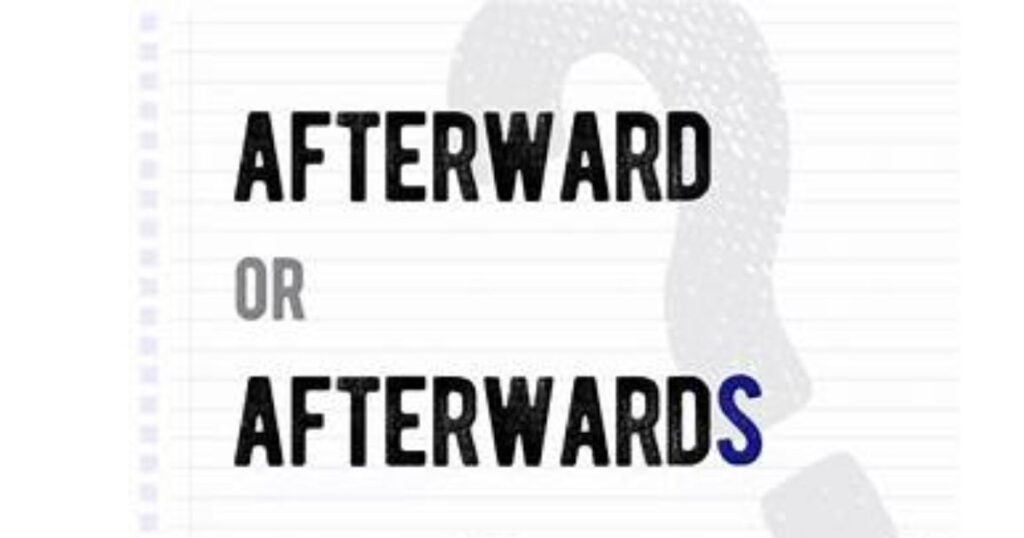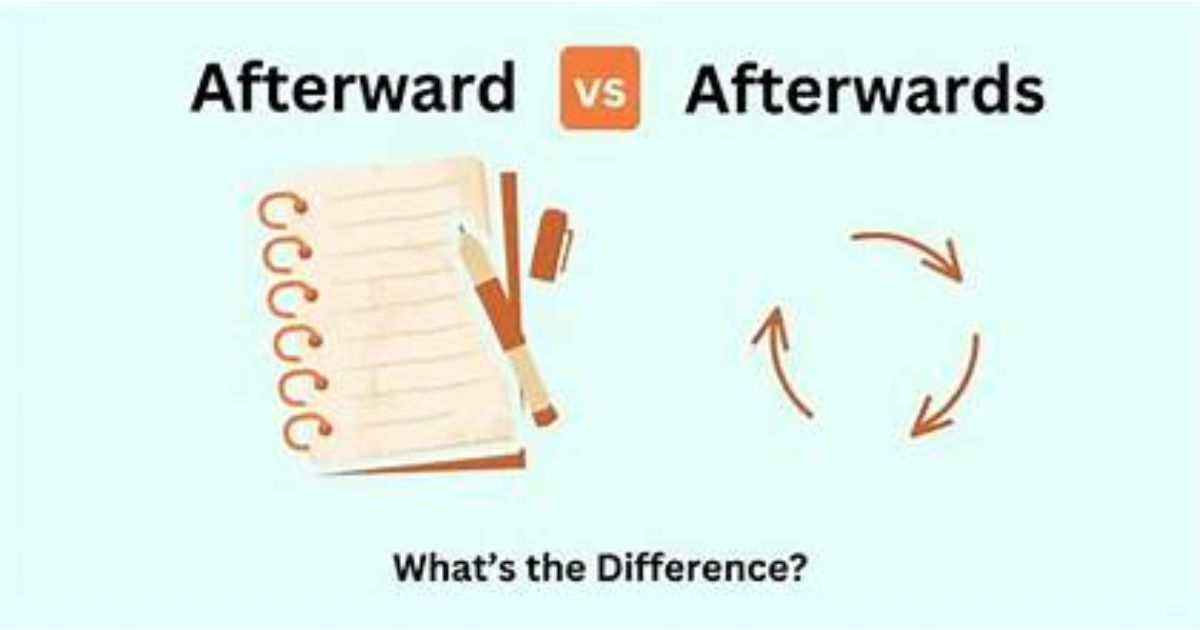Have you ever paused while writing and wondered whether to use “afterward vs afterwards”? You’re not alone! These two words often confuse writers because they look and sound so similar. Yet, many people aren’t sure if one is more correct than the other.
Let’s dive into this topic, clarify the confusion, and help you confidently choose the right word for your sentences.
Why is There Confusion?
The confusion comes from the fact that both afterward vs afterwards are adverbs that mean the same thing: something happening later or at a future time. People wonder if there’s a difference in meaning, usage, or formality.
Adding to the mix is the subtle distinction between American and British English, which influences which form people use more often. This small variation in usage creates uncertainty, especially for students, non-native speakers, and even seasoned writers.
So, is one word wrong and the other right? Or is this just another case of regional preference? Let’s find out.
READ MORE: Motif vs Theme: Clarifying the Confusion
What Do ‘afterward vs afterwards Mean?

Both “afterward” and “afterwards” are adverbs. They indicate that an event or action occurs later in time or following another event. The meanings are identical.
Definition of Afterward:
“Afterward” refers to something happening at a later time or subsequently.
Example:
- “We went to the concert, and afterward we had dinner.”
Here, the dinner happened after the concert.
Definition of Afterwards:
“Afterwards” has the exact same definition as “afterward.” It’s also used to describe something that happens later or following another action.
Example:
- “We went shopping, and afterwards we relaxed at the café.”
In both sentences, the key idea is the same: one thing happens, then another thing follows.
“Afterward” vs “Afterwards”: The Differences
When it comes to meaning, there’s no difference. However, the choice between “afterward” and “afterwards” depends on regional preferences, writing style, and personal habits. Here’s the main distinction:
American English:
- Americans typically use “afterward” without the ‘s.’
- It’s considered the standard form in formal and informal writing.
- Example: “He finished his work and went home afterward.”
British English:
- British writers lean toward using “afterwards,” with the ‘s.’
- It’s more commonly seen in British texts, both casual and professional.
- Example: “She had lunch with her friends and went shopping afterwards.”
While this difference might seem minor, it reflects a broader trend between American and British English. Americans tend to simplify word forms, while British English keeps some traditional spellings.
British English Words Ending in ‘s’ vs American English
The difference between “afterward” and “afterwards” fits into a larger pattern of how American and British English handle certain adverbs. British English often retains the ‘s’ at the end of words, while American English tends to drop it.
Examples of Similar Words:
- Towards vs Toward: British writers prefer “towards,” while Americans use “toward.”
Example: “He walked towards the house” (British) vs. “He walked toward the house” (American). - Forwards vs Forward: British English often uses “forwards,” whereas Americans choose “forward.”
Example: “She took a step forwards” (British) vs. “She stepped forward” (American). - Backwards vs Backward: Similarly, British English adds the ‘s,’ while American English does not.
Example: “He fell backwards” (British) vs. “He fell backward” (American).
These differences don’t change the meaning of the words; they’re just a reflection of language evolution. The same principle applies to “afterward” and “afterwards.”
Which One Should You Use: “afterward vs afterwards”?
So, how do you decide which word to use? Here are a few simple guidelines:
Consider Your Audience:
- Writing for Americans? Use “afterward.”
- Writing for Brits? Use “afterwards.”
If you’re writing for an international audience, either word works. However, sticking to one form throughout your writing is recommended for consistency.
Formal or Informal Writing:
Both forms are acceptable in formal and informal contexts. However, “afterward” might feel slightly more formal in tone, which aligns with American English’s streamlined style.
Personal Preference:
At the end of the day, there’s no wrong choice. Use the form that feels natural to you!
Examples in Context
Seeing how these words are used in sentences can make things clearer. Let’s explore real-world examples of each.
Afterward Examples:
- “The meeting ended at 3 PM, and we had a quick chat afterward.”
- “He studied for hours and went to bed afterward.”
- “I’ll text you afterward if I find any updates.”
- “They cleaned the house and relaxed afterward.”
Afterwards Examples:
- “We played football in the park, and afterwards we got ice cream.”
- “I missed the train, but afterwards, I managed to catch a cab.”
- “She apologized for her behavior afterwards.”
- “You can finish your homework now or afterwards—it’s your call.”
Both words fit seamlessly into the examples, and neither one sounds awkward or incorrect.
Synonyms and Similar Terms to “afterward vs afterwards”
Sometimes, it’s helpful to use a synonym or phrase instead of repeating the same word. Here are some great alternatives.
Synonyms for Both “Afterward” and “Afterwards”:
- Later: “She called me back later that evening.”
- Then: “We watched a movie and then went out for dinner.”
- Subsequently: “The product was launched and subsequently became a huge success.”
- At a later time: “We’ll discuss this matter at a later time.”
These words and phrases keep your writing fresh while preserving the same meaning.
More Specific Alternatives:
- Following that: “He completed his assignment; following that, he took a nap.”
- In the future: “Let’s keep this idea for in the future.”
- Later on: “She didn’t understand the topic at first but grasped it later on.”
These alternatives can add variety and nuance to your sentences.
Origins of “Afterward” and “Afterwards”
Understanding the history of words helps us appreciate why they exist in different forms.
Origins of “Afterward”:
“Afterward” comes from the Old English word “æfterweard.”
- “Æfter” means “after,” and “weard” refers to motion or direction.
- This form evolved into “afterward,” reflecting the American English preference for simpler spellings.
Origins of “Afterwards”:
The word “afterwards” also stems from Old English. However, the ‘s’ was added during the Middle English period to form adverbs. This pattern is still seen in British English, which retains the ‘s’ at the end of certain adverbs.
Although these two words have slightly different spellings, their roots are identical, which explains why their meanings are the same.
A Final Look at “Afterward vs Afterwards”
Let’s sum everything up. The words “afterward” and “afterwards” are interchangeable in meaning, and both are correct. The choice boils down to regional preference and writing style.
- Use “afterward” if you’re following American English conventions.
- Use “afterwards” if you’re following British English conventions.
- When in doubt, remember that neither form is wrong—just pick one and be consistent.
By understanding these small differences, you’ll gain confidence in your writing and be able to use these words naturally in your sentences.
Sources
- Merriam-Webster Dictionary
- Cambridge Dictionary
- Online Etymology Dictionary

Osbert is a skilled linguist and educator specializing in English grammar and vocabulary. With years of experience, he has dedicated his career to helping learners enhance their language skills. Osbert is passionate about simplifying complex grammar concepts and is the founder of EnglishInfoz.com, a platform focused on English language education.
